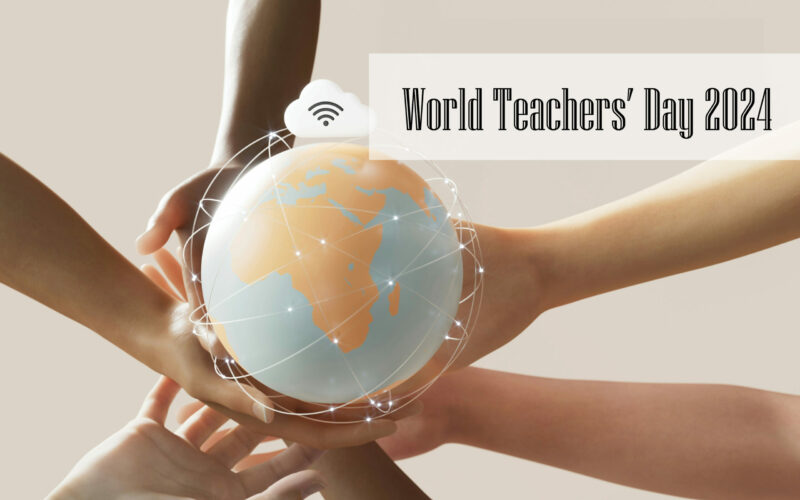
By Dr Evode Mukama
Adviser: Teacher Education COL
In alignment with the 2024 theme for World Teachers’ Day, “Valuing Teachers’ Voices: Towards a New Social Contract for Education” (UNESCO), this reflection explores how teachers perceive their roles in Open and Distance Learning (ODL) course facilitation, extending beyond their traditional duties as curriculum developers, learning facilitators, evaluators, classroom managers and reflective practitioners. In fact, teachers’ experiences and perspectives are critical in driving transformative change in education. The Commonwealth of Learning (COL) plays a pivotal role in empowering teachers by leveraging ODL, expanding the pool of qualified teachers, and preparing a new generation to meet the growing demand for quality education. This reflection showcases the voices of teachers who facilitated the “Teaching Science with Technology” massive open online course (TST MOOC) offered by the University of Abuja in Nigeria, with COL support.
Resilient facilitators: Coping with anxiety and technical challenges
Facilitating a MOOC for the first time brought anxiety and uncertainty for many teachers. One teacher shared, “Everything was hazy by the time the course opened on 13 May 2024, as this was my first MOOC facilitation. Despite the training, I was unsure what to expect” (Teacher 1). However, as they engaged with participants, the teachers overcame their initial apprehension. Another teacher said, “I was both excited and nervous but determined to create a supportive environment” (Teacher 5).
In addition to anxiety, teachers faced technical challenges such as limited computer skills and unreliable internet. One teacher remarked, “One of my challenges was my limited computer knowledge, but this motivated me to quickly improve my skills” (Teacher 7). Their ability to adapt and overcome these challenges highlights their resilience, making them not just facilitators but resilient facilitators capable of navigating both pedagogical and technical hurdles.
Ethical guides: Addressing AI intrusion in ODL
One of the challenges teachers faced in the MOOC was the increasing use of Artificial Intelligence (AI) by participants to generate responses. Teachers noticed that some learners were posting AI-generated content without much personal input. Teacher 3 stated, “I observed that some participants gave very lengthy discussions, which was against the guideline, and I equally noticed that this was a result of the use of Artificial Intelligence (AI).” Teacher 2 explained, “It became necessary to remind participants to contextualise AI-generated responses and give them a personal touch.”
Despite repeated reminders, some participants continued using AI inappropriately. “Over time, with consistent encouragement, the use of AI decreased,” Teacher 6 said. This demonstrates how teachers assumed the role of ethical guides, ensuring learners engaged critically with content and maintained academic integrity while managing the increasing reliance on AI tools.
Community builders: Fostering collaboration and trust
Creating a sense of community is vital in ODL, where learners may feel isolated. Teachers played a key role in building these connections. One teacher noted, “Creating a sense of community was a priority. I encouraged participants to share their experiences, which helped build trust and collaboration” (Teacher 7).
Additionally, teachers emphasised that the community of learning required the active participation of both teachers and learners. Teacher 5 explained, “Participants’ active engagement emerged as a pivotal theme throughout the TST MOOC, demonstrating a significant commitment to fostering active participation in discussion forums and collaboration.” At the same time, teachers had to address different learning styles. As Teacher 7 argued, “Catering to different learning styles was key, and participants gave positive feedback, showing they understood the course objectives.” These actions highlight teachers’ roles as community builders, facilitating collaboration and peer interaction in online environments.
Co-creators: Participating in knowledge construction
Teachers also played a central role in fostering knowledge construction. Teacher 2 observed, “At first, only a few participants contributed. But once we, teachers, began commenting, more participants engaged in discussions.” This shows how teachers acted as co-creators, encouraging learners to express their ideas and refine them.
Teachers used probing questions to help learners clarify their thoughts. “Sometimes, participants were unclear in their responses, and I had to ask questions to help them clarify” (Teacher 2). Teachers actively contributed to the learning process by guiding discussions and encouraging reflection, ensuring that knowledge construction was a collaborative effort between facilitators and learners.
Lifelong learners: Committing to continuous professional development
Facilitating the MOOC also provided an opportunity for teachers to grow professionally. One teacher reflected, “Facilitating this course pushed me to think creatively and adapt to new situations. I plan to attend more workshops to enhance my skills” (Teacher 7). Teacher 4 emphasised how their active interaction with learned contributed to gaining new skills: “On a personal level, this experience significantly enhanced my facilitation skills and broadened my perspectives through engagement with a diverse group of learners.” This commitment to growth highlights teachers as lifelong learners who continuously seek to improve their skills in online teaching.
Teachers also reflected on their teaching practices, identifying areas for improvement. “Engaging in reflective practice has highlighted the importance of ongoing professional development” (Teacher 7). This dedication ensures that teachers remain adaptable and effective, continuously evolving in their roles as ODL facilitators.
Conclusion
The experiences of ODL teachers showcase the diverse and evolving roles they play in the learning process. As resilient facilitators, they manage anxiety and technical challenges. As ethical guides, they address AI intrusion and ensure academic integrity. Their efforts as community builders foster collaboration, while their role as co-creators drives knowledge construction. Finally, lifelong learners embrace continuous professional development to enhance their teaching skills. Together, these voices illustrate how ODL teachers are shaping the future of education, demonstrating adaptability, resilience, and a commitment to their own growth and the success of their students.


